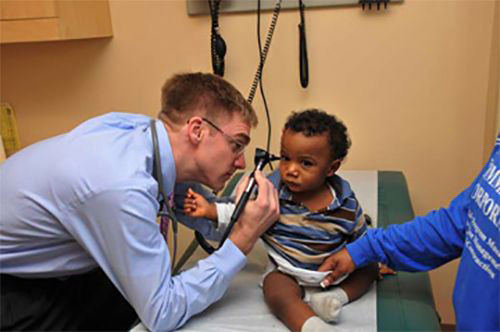
The Tulane Allergy and Clinical Immunology Fellowship training program is fully accredited by the ACGME. Our program is a combined Internal Medicine and Pediatrics program permitting entry of residents trained in Internal Medicine, Pediatrics, or both. All trainees receive comprehensive clinical training in adult and pediatric allergic and immunologic diseases.Read More
The Clinical Immunology and Allergy Unit includes the Histocompatibility and Immunogenetics Laboratory. Fellows may complete their research requirements through participation in ongoing projects within the department. Trainees also have the opportunity to develop protocols for new research proposals, and such efforts are encouraged. Research opportunities also exist at the USDA where ongoing studies focus on the effects of processing on the allergenicity off peanuts and tree nuts.
The program is based at the Tulane Medical Center, which includes campuses in downtown New Orleans and Metairie. Fellows also rotate through the clinics and consultation services of affiliated hospitals, including the Southeast Louisiana Veterans Healthcare System and Ochsner Medical Center. Second-year fellows also provide care at the NOELA Community Health Center, a federally funded clinic established for underserved patients in New Orleans East. This variety in training settings allows fellows to care for a diverse patient population and ultimately provides a broad and fulfilling educational experience.
Each clinical service is supervised by faculty and consists of a fellow in training, medical residents rotating through our service, and medical students together with our nurses and supporting staff. Clinical service comprises 50-60% of the fellow's time; the remainder of his or her time is devoted to conferences and research activities.
Procedures: Fellows routinely conduct skin prick testing, food challenges, medication challenges, spirometry including interpretation, and a variety of other procedures. Fellows are often referred complex cases requiring more clinic time than is available to an allergist in private practice, e.g., procedural evaluation of perioperative anesthesia. Most procedures are conducted in routine outpatient settings, with certain high-risk procedures deferred to a dedicated procedure clinic.
High-Risk Procedure Clinic: Fellows participate in multiple high-risk procedure clinics. Patients present to these clinics for rush immunotherapy with venom and inhalant allergens, AERD diagnosis and treatment, food challenges, drug challenges and/or desensitization, and other high-risk procedures. Several of these high-risk procedure clinic have direct access to spirometry, thus facilitating some of these procedures. Both adults and pediatric patients are seen in this clinic. Low-risk procedures are routinely performed in all clinical settings.
Training Locations: Multiple locations provide an opportunity to care for a diverse patient population in a range of environments, yielding a robust training experience which prepares fellows for a variety of post-fellowship practice settings. Across these locations, our patient ratio is approximately 70% adult and 30% pediatric.
Tulane Medical Center (adult)
Southeast Louisiana Veterans Health Care System (adult)
NOELA Community Health Center (adult/pediatrics)
Ochsner Medical Center (adult/pediatrics)
Call: The inpatient/consultation service is designed to provide fellows with experience in evaluating and managing the inpatient and consultation care of adult and pediatric patients with diverse allergic and immunologic diseases. This part of the fellow's educational experience is provided on a rotating basis, with each fellow responsible for a total of six months of call spread across two years of fellowship training. A single pager is shared among the fellows. This is home call, and the average number of weekly consultations is three. The fellow on call also answers occasional after-hours pages regarding urgent issues for established clinic patients.
Fellows are provided opportunities to complete their research requirements through participation in newly designed research protocols or in ongoing projects. In order to provide fellows with the skills needed to complete various types of research projects, early in their fellowship they are required to attend the Methods in Clinical Research course given by John Carlson, MD PhD. The primary goal of conducting research during fellowship is to further one's appreciation for and general understanding of research principles, as well as to foster habits for the critical interpretation of scientific literature. The fields of allergy and immunology are rapidly evolving.
